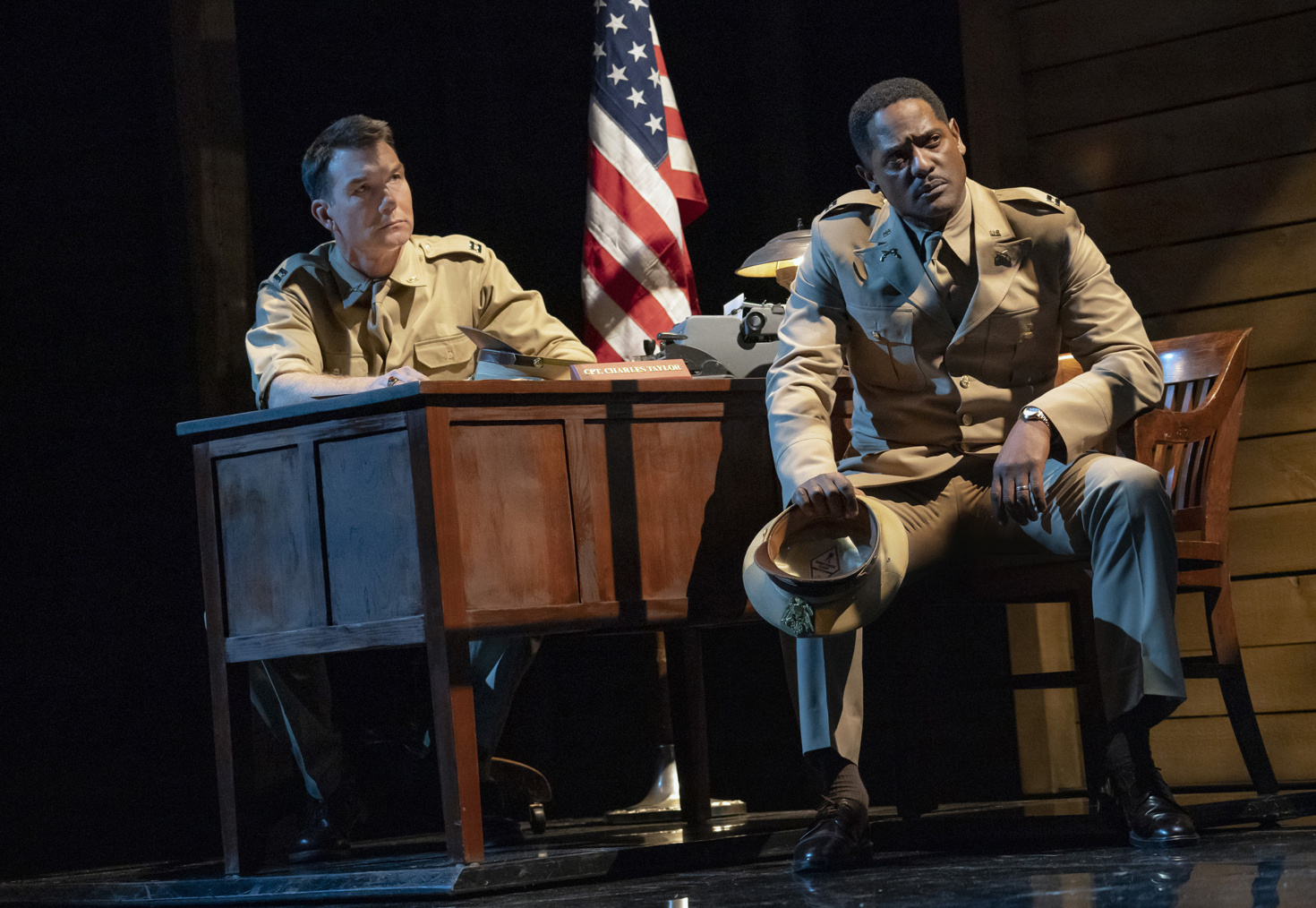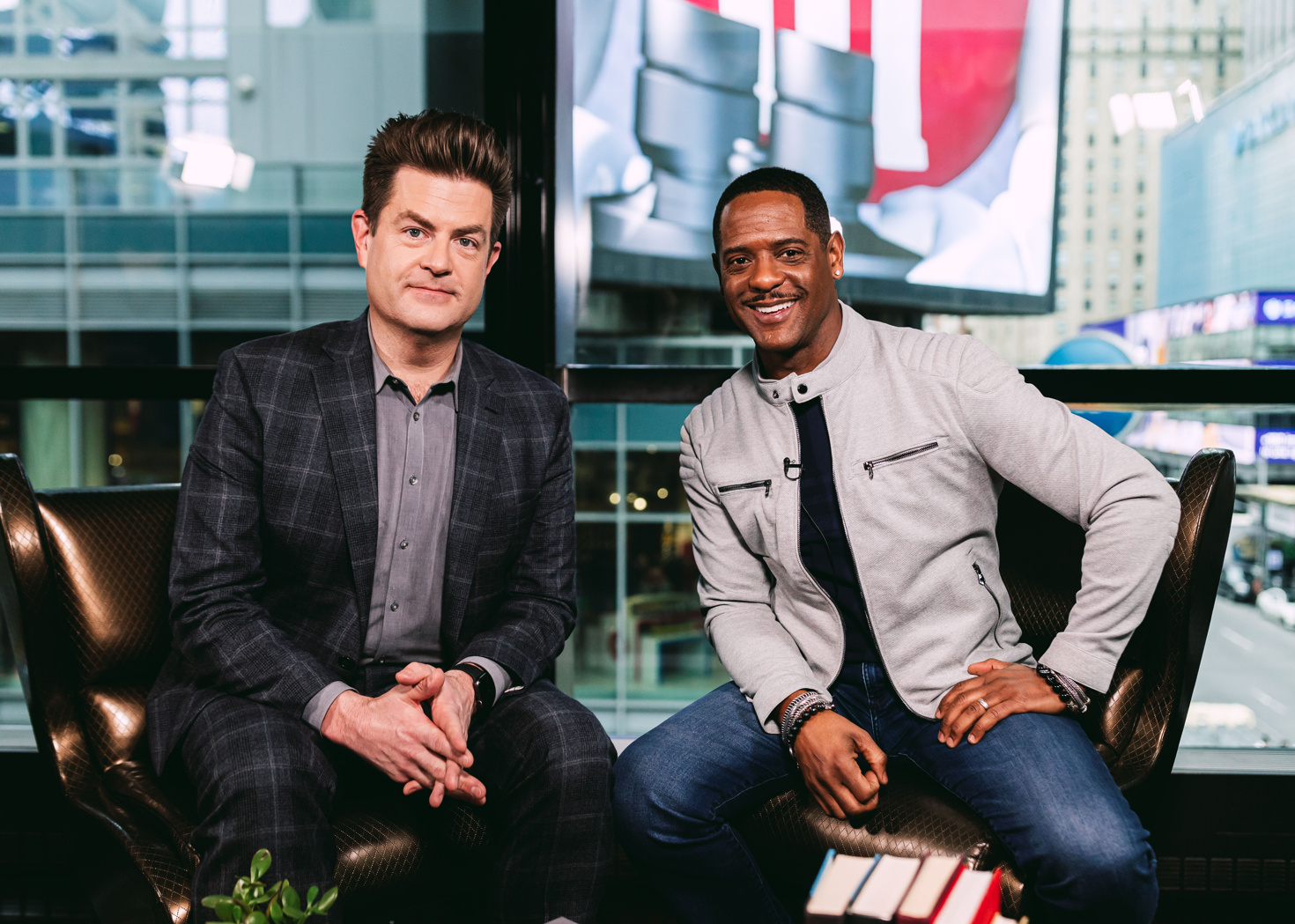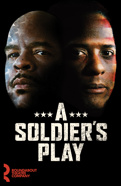
(Photos by Emilio Madrid for Broadway.com)
Why Blair Underwood Is Honored to Be Working Alongside the 'Young Lions' of A Soldier's Play

Emmy-winning actor Blair Underwood is currently playing Army captain Richard Davenport on stage, in Charles Fuller’s Pulitzer-winning work A Soldier’s Play, on Broadway for a limited run until March 15. In the play, Davenport is called to investigate the murder of a black army sergeant (played by David Alan Grier) in a segregated Army base in 1944. Underwood made his screen debut in 1985 in the film Krush Groove and has since made a steady screen career with L.A. Law (which earned him his first Golden Globe nomination), In Treatment (another Globe nom), and in recent years, he’s appeared in When They See Us, MARVEL AGENTS OF S.H.I.E.L.D. and Dirty Sexy Money. In 2012, he made his Broadway debut playing Stanley Kowalski in A Streetcar Named Desire. Read below or watch the video to see why Underwood chose A Soldier’s Play for his Broadway return and why he avoids reading reviews.
This is a beautiful production of A Soldier's Play. Are you enjoying being a part of that ensemble?
I'm loving every minute of it. I'm literally trying to breathe in these last few moments in the last few weeks. I love the theater. I love being on stage. I started doing dinner theaters initially. Anytime I can get back and get a foot on the boards, I love doing it. But it has to be the right project, the right time and the right commitment. [A Soldier's Play is] a limited run; it was 11 weeks total. It's just perfect.
How did this project come into your lap? A phone call from director Kenny Leon?
Yeah. I got a call from Kenny. He knew a friend of a friend, who knew my wife. My wife texted me, she said, "Kenny Leon was trying to reach you." I called him back. He said, "We're doing A Soldier's Play on Broadway." I could not believe it had never been on Broadway. It started off-Broadway in 1981 through ’83 at the Negro Ensemble Company—I always want to give them credit and pay homage to them. It started there, but had never been on Broadway. I wanted to be a part of that. I knew David Alan Grier had signed on at that point. I'd never worked with him.
You two had never crossed paths?
We crossed paths just in passing. I've seen his work. I saw him in Race and The Wiz Live. I was a fan of his work. Then afterwards, Jerry O'Connell came on-board. The ensemble, I call them these young lions, are just killing it every, every night on that stage. It's an honor to be a part of it.
Did you know either the play itself or the film adaptation, A Soldier’s Story?
I didn't know the play. I had seen the movie A Soldier's Story of course. I remember from the movie that, from playing a lawyer on L.A. Law many years ago, [Davenport] was a trained lawyer; he's asking a lot of questions. Then when I read the play, I found out that he's the narrator of the play. He has three monologues that set up the story. It gives the actor a chance to see how the story is affecting him. I saw the opportunity to play more colors and explore more sides to this character than just the interrogator and investigator.
You have military in your blood. Wasn't your dad in the Army?
Yeah, my dad was in the army 20 years ago. He's a retired army Colonel.
Have you played a military guy before? Isn’t there a certain way to stand?
There is that. We talk about that a lot, that military bearing as they call it. The way you walk, the way you talk, the way you present yourself, the way you salute, is very important. It can't be all sloppy. It's all about precision. [Laughs.] It's funny. My first movie I did was called Krush Groove in 1985 when I first got out to Hollywood. I remember auditioning for that part and a producer told me this later, he said, "You came in and you auditioned. We liked you, but we didn't know if you're going to be sexy enough or if the women would like you or not. So we went around the office and we showed all the girls your picture. The producer Doug McHenry said, ‘He looks like one of those A Soldier's Story Negroes. I don't think he's going to sell on the big screen.'" [Laughs.] I don't know what they said, but I ended up getting the part.
By the way, that was good work in Krush Groove. Where's that Broadway musical?
[Laughs.] Well yeah man, we need to have that. That's what we need on Broadway, Krush Groove: The Musical.

This is a fun group of actors at A Soldier's Play. There's a lot of drama on stage. What about backstage?
It's been amazing. I tell you, we have a fight call of course before every showing. You come out and go through any kind of physicality, they're warming up. David Alan Grier is so hilarious, every day, he's on. J. Alphonse Nicholson, who plays CJ, said, "If you ever want to laugh, come to fight call." You may be tired and beat down, but he always puts you in a great mood. It's a show in and of itself.
You were fantastic in your Broadway debut as Stanley Kowalski in A Streetcar Named Desire. What are your memories of that?
It was amazing. I remember being somewhat intimidated by it and very excited to do it but not sure what that was going to be. It's a very different experience this time having gone through that. I learned then, don't read reviews, don't get caught up in other people's opinions, just focus on the words. I actually haven't read my own reviews in 20 years. If they give you a great review, that's something that you can pinpoint and then it morphs into something bigger than it used to be.
You start to focus on a moment that they liked and then suddenly everything becomes—
The moment is obliterated. It changes it, now [you’re] trying to make it better or bigger. By the same token, negative reviews—it's hard in theater when you have to recreate that role night after night. It can be in the back of your head. It's different with film because you've done it. It's up on screen. It's going to be what it's going to be. Part of that experience [with Streetcar] was not to put weight on that. You hope people love it. You create what you're creating to entertain an audience. If they do, and many did, then it's great. If not, that's fine too. With that said, I was one of those kids that grew up and said, “I want to be on Broadway one day.” And to be given that opportunity was magical.

You do a lot of film and TV work out in California, but when you come to New York for a few months to do a show like this, what do those runs mean in the overall scope of your life?
It's a beast, first of all, doing eight shows a week. A lot of actors who come from [Los Angeles] and they do it, that's the first thing, “Dude, how are you holding up eight shows a week?” It's a challenge, but I love it. If you love it, it pulls you through. It's important to hone the skills. I'm learning something new every night. That's the great thing about limited runs. In a four or five month [run], you are constantly learning and discovering things every night. I love that part of it. And I live in the theater district in Hell's Kitchen. I can walk to work. I often do because I like the walk, especially after a show. Last night, I walked home to clear my head. It was a two-show day. It's the electricity, literally and figuratively, of this theater district and Broadway and everything that comes with it.
Do you have any dream roles?
Absolutely, man. I had a chance to do Paradise Blue written by Dominique Morisseau at Williamstown Theater Festival [in Massachusetts] in 2015. It was the world premiere and I had a chance to originate that role [of the trumpet player Blue]. It was directed by Ruben Santiago-Hudson. I very much want to bring that to Broadway. It was at the Signature [off-Broadway] a couple of years ago with J. Alphonse Nicholson. It was phenomenal. I was unable to do it at the time because I was doing a show on ABC. I'd love to bring that to Broadway. I'm talking to anybody who will listen: Paradise Blue.
I'm listening. More Blair on Broadway, please!
As long as you'll have me, I'll be here.

